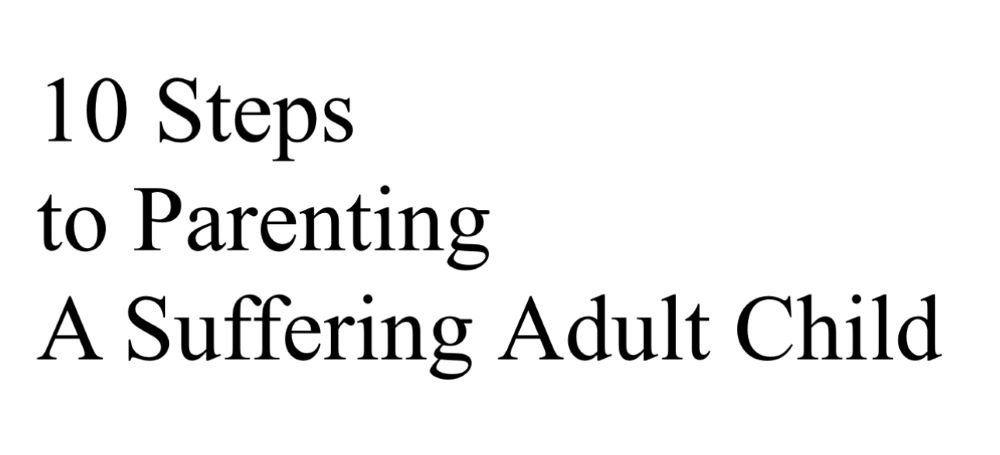One of my sons was going through a particularly bad time when he was younger. As his mom, I felt as though I’d taken on a second job. It seemed my role was to fix the problem, worry about it, seek help for it, become frustrated by it and by all means be consumed by it.
One evening, a friend spoke the immortal words I needed to hear to understand my obsessive state: “You can only be as happy as your saddest child.” That’s it! His suffering was causing me to suffer! No wonder I was so single minded in pursuit of a solution. He wasn’t okay and by extension neither was I.
Like all parents, I’ve been through occasions with a child who was suffering. While I know adversity creates resilience and it isn’t necessarily a bad thing for my child to experience, I find it exceedingly difficult to know how to parent an adult child navigating a tough time.
I had thought all parents had the same reaction to their adult child going through a rough patch but have learned we each go through our own respones. Below is my compilation of my own reactions as well as other parents’ particular responses. There is no chronological order to the steps. We each have our favorites. I vacillate between #2 and #4 with occasional stops at #5.
Step One: The Inclination to Pity
This is a very real step in the parenting playbook when you have a child who is suffering. “The poor kid” you think. “Why him? He can’t catch a break.”
I spend about 42 seconds in this place, because I have seen the destruction a pitying parent creates. My mother always pitied my older brother. “Poor you” isn’t exactly an empowering message and can make you feel like you have no control over your own life.
When I was in my 20s, I was a close to a young girl who had experienced terrible abuse by a relative. I pitied her. Her mom told me she wanted none of that. She explained that her daughter was getting help for what had happened but not to pity her. “No school and no employer are going to care about what happened to her when she was a little girl,” was her response to me.
I thought she was so harsh but grew to learn how right she was. My sons survived their early years in a very deprived orphanage. While I could spend the rest of my days crying over their circumstances, I also know they want to have full, happy lives.
Yes, they are well acquainted with adversity, but they use it as a strength. What is life going to throw at them that is harder than being a baby in an orphanage? In a way, their ability to tolerate challenges is their superpower. Pity would have thrown a wet blanket on this incredible strength.
Step Two: Parent to the Rescue
Another popular step is problem solver. This is my personal favorite. Who do I need to call? What do I need to do? Their problems are my problems, and it’s my job to fix them.
While this does not signal to my sons that I believe they can fix their own problems, I’m not really worried about them, am I? It’s my feeling of anxiety I want to rid myself of, so I push them out of the way and tell them I’ll take care of it. It’s the most self-serving thing I can do. I tell myself it is rooted in concern for them.
Step Three: Disillusionment
I’m not suggesting any of our dear, sweet, wonderful children would lie to us. I’m just saying sometimes there might be more to the story. You know how there are three sides to a story—yours, mine and the truth? It doesn’t hurt to ask questions. Skepticism isn’t necessarily a bad thing.
Something terrible might be happening to our adult child, but they may have played a small part that led up to the terrible thing.
Step Three: Facing the Brick Wall of their Apathy
Some people are unhappy and unwilling to do what is needed to create change. It’s really difficult/frustrating/aggravating/infuriating to be an effective support person for them.
What do you do when you have a suffering child who won’t make any change to alleviate their suffering? They might be overweight but won’t eat better or exercise. They hate their job but won’t look for another. Their relationship is destructive, but they won’t break up with the person.
Many parents have bruises on their forehead from this brick wall..
Step Four: The Great Step Back
“They’ll figure it out,” you tell yourself. They’re an adult. You can’t fix what you don’t control. If your 10-year-old is overweight you can choose different foods and have a family walk every night after dinner to get them 10,000 steps. When your 25-year-old needs to lose weight, it’s all on them.
My friend, MaryAlyce, always said, “You can’t want something more for them than they want it for themselves.”
I was listening to a podcast recently, and the guest had trained as an EMT. She said when they did practice drills, each of them had a role: victim, EMT or onlooker. She said onlooker was the hardest. Even though it was only practice, it was terrible to watch someone suffer and not be able to help.
I felt that.
Step Five: Compare & Despair
This is typically when I get frustrated and angry that my efforts to fix the problem have not yielded results. Things I think to myself in this phase are, “I would never have even gone to my parents with any problem. I just figured everything out on my own.” I also think of the refugees of other countries and soldiers at war and think, “They have real problems. Imagine having those problems!”
Deep down, I know I am very happy I have sons who will talk to their parents when they have struggles. I don’t want them to feel they have to figure everything out on their own. I also acknowledge that while there are certainly people their age with bigger problems, that doesn’t diminish their own challenges.
I also know this is more about my level of frustration and feeling powerless than it is about my sons or what they are going through.
Step Six: Loneliness & Isolation
When your kids are little, you can share their problems. Will they ever stop sucking their thumb? Why are they so obsessed with construction sites and fire trucks? How do I get the theme from “Barney & Friends” out of my head?
By the time they’re teenagers, you have to be discreet when they share a problem with you. It isn’t your story to share with anyone; it is theirs. You don’t want to betray their confidence, and you definitely don’t want anyone judging them or gossiping about them.
So, it’s just you and the other parent. You discuss the problem ad nauseum until you both decide you need a break from discussing it. You find each other in different steps each day. One might be in Compare & Despair. The other one might be in Parent to the Rescue. It might be a challenge to be on the same page.
Step Seven: The Kindest Refusal
If every time I saw you, I complained about my boss, you might first listen with empathy. Then, you might recommend I look for another job. The next time I went on and on complaining, you might even tell me about job openings. Eventually though, you will have had enough.
You might say, “It seems we always end up in the same place when we talk about your boss. You aren’t happy but you aren’t going to leave, so let’s just acknowledge that right now and talk about something else.”
Cold right? I thought so at first, but then I learned about secondary gain. Secondary gain is the benefit you receive from NOT solving your problem. We all do what serves us best. If we have a problem we are unwilling to solve, we have to ask ourselves, what am I getting from this? In some cases, its attention. This kind refusal to continue to discuss the problem removes that secondary gain.
Step Eight: Patiently Abiding
Your adult child is either working or not working on the problem. What are you doing about it? Nothing. Just go about your life, wonder every day how they are doing and maintain self-control. Your mantra is, “They’ve got this. They know I’m here if they need support.”
You learn to tolerate your adult child struggling. You reread Codependent No More. You know that while this doesn’t feel like love at all, letting them find the right solution for themselves is love. You’ve said what can say. You’ve done what you can do. You work on yourself, work toward feeling peace.
(This is very different from delusion, where, if your child’s problem is too painful for you or not consistent with your view of yourself and your family, you don’t even acknowledge the problem, leaving them completely alone with it. While that may be a coping mechanism, it isn’t parenting.)
Step Nine: The Healthy Response
Through therapy, having friends who are therapists, reading parenting books, (Good Inside and Codependent No More are favorites) I’ve learned what the right thing to do is. I don’t always do it. Most times when I do it, it doesn’t even feel right. It doesn’t feel like love.
What is the right thing? The right thing to do when your child is suffering is to express empathy and offer encouragement. Here is how that sounds:
Your child tells you about their challenge. You say:
“I’m sorry you are going through this, but I’ve seen you overcome challenges in the past, and I’m confident you’ll figure this out. I’m here though if you want to talk.” Period. End of sentence.
You say to your suffering adult child what you would say to me or your
spouse or your good friend. You are talking to another adult who has a problem. It is their problem. You can listen, offer advice if asked, say words of encouragement and tell them you are sorry they are going through this. You can’t do the work that is theirs to do.
Step Ten: Acceptance
You no longer have a child. You don’t have a teenager. You have raised an adult. Their choices are not your choices. How they lead their lives is completely on them.
If they are continuing to suffer despite your best efforts, maybe the suffering is doing important work in their life. Suffering can be a great catalyst for change. We have to remember it is their work to do.
Your job as on-call fixer has been eliminated. You are in retirement. Do you know how annoying it is when someone who has retired keeps telling their replacement what to do? We are no longer the manager. Our title is Emeritus. What could we say instead of telling them what to do? Consider this:
“I have every confidence you’ll do a great job. You are going to stumble sometimes. That’s completely normal. You have what it takes to pick yourself up. And if you find you can’t pick yourself up, you know how to access the resources to help you. I’m always here for you.”
My friend, MaryAlyce, used to love to cook. She would have us over for dinner, and there would be a pot on every burner and something cooking in the oven. I would always ask, “how can I help?” Her response was always the same, “you can help by not helping.”
One of my favorite authors, Anne Lamott, said, “Help is the sunny side of control.” It’s the same message. Parenting the adult child who is suffering requires you to do and say things that don’t feel or sound like love. Maybe it is the ultimate form of love – to acknowledge and respect your child’s autonomy and free will.
It’s got to be the hardest work we do as parents.




0 Comments